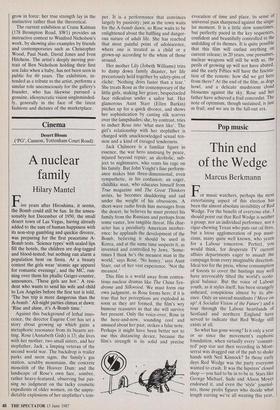Cinema
Desert Bloom (PG', Cannon, Tottenham Court Road)
A nuclear family
Hilary Mantel
Five years after Hiroshima, it seems, the Bomb could still be fun. In the unsea- sonably hot December of 1950, the small desert town of Las Vegas, having already added to the sum of human happiness with its non-stop gambling and quickie divorce, was preparing for the first peacetime A- Bomb tests. 'Science types' with sealed lips fill the hotels, the children are dog-tagged and blood-tested; but nothing can alarm a population bent on fiesta. At a beauty contest the girls wear 'atomic age apparel for romantic evenings', and the MC, run- ning over them his phallic Geiger-counter, announces, 'These girls are hot.' A resi- dent who wants to send his wife and child to Los Angeles before the first test is told, 'The bus trip is more dangerous than the A-bomb.' All-night parties climax at dawn: 'Rise and shine, it's A-Bomb time.'
Against this background of lethal inno- cence, the director Eugene Corr has set a story about growing up which gains a metaphoric resonance from its bizarre set- ting. Rose (Annabeth Gish) is 13; she lives with her mother, two small sisters, and her stepfather, Jack, a limping veteran of the second world war. The backdrop is trailer parks and neon signs, the family's gas station, scrubby mountains, the concrete monolith of the Hoover Dam; and the landscape of Rose's own face, sombre, rather heavy-featured, observing but pas- sing no judgment on the tacky cosmetic expedients of older women, on the unpre- dictable explosions of her stepfather's tern- per. It is • a performance that convinces largely by passivity; just as the town waits for the A-bomb dawn, so Rose waits to be enlightened about the baffling and danger- ous nature of adult life. She has reached that most painful point of adolescence, where one is treated as a child or a grown-up according to the whim of those around.
Her mother Lily (Jobeth Williams) tries to damp down family disaster, her life precariously held together by safety-pins of cliché: 'Nothing dries faster than a tear.' She treats Rose as the contemporary of the little girls, making her grave, bespectacled face ridiculous under a sailor hat. Her glamorous Aunt Starr (Ellen Barkin) pitches up for a quick divorce, and shows her sophistication by casting silk scarves over the lampshades; she, by contrast, tries to induct Rose into 'what men like'. The girl's relationship with her stepfather is charged with unacknowledged sexual ten- sion and a kind of enraged tenderness.
Jack Chilmore is a familiar figure in essence, the war hero unstrung by peace, injured beyond repair; an alcoholic, sub- ject to nightmares, who vents his rage on his family. But John Voight's fine perform- ance makes him three-dimensional, even sympathetic, in his confusion; an eager, childlike man, who educates himself from True magazine and The Great Thinkers series, he becomes shuddering and sad under the weight of his obsessions. A short-wave radio feeds him messages from the desert; he believes he must protect his family from the Russians and perhaps from some vaster, less tangible threat. His char- acter has a peculiarly American incoher- ence: he applauds the development of the Bomb, believing it should be used in Korea, and at the same time suspects it, as invented and controlled by Jews. 'Some- times I think he's the meanest man in the world,' says Rose. 'No honey,' says Aunt Starr, out of her vast experience. 'Not the meanest.'
This film is a world away from conten- tious nuclear dramas like The China Syn- drome and Silkwood. We must form our own judgment, as Rose forms hers; if it is true that her perceptions are exploded as soon as they are formed, the film's wry humour reassures us that she will survive her present. Only the voice-over, Rose in the here-and-now, sounding cool and amused about her past, strikes a false note. Perhaps it might have been better not to use this distancing device, because the film's strength is its solid and precise evocation of time and place, its sense of universal pain sharpened against the singu- lar moment. It is a little slow sometimes, but perfectly paced in the key sequences, confident and beautifully controlled in the unfolding of its themes. It is quite possible that this film will outlast anything on current release; in 20 years, one presumes, nuclear weapons will still be with us, the perils of growing up will not have abated, and the early Fifties will have the fascina- tion of the remote: how did we get here from there? At the end of the film, as dogs howl, and a delicate mushroom cloud blossoms against the sky, Rose and her father have achieved a frail concordat. The note of optimism, though sustained, is just as frail; and we are in the fall-out era.



























































 Previous page
Previous page